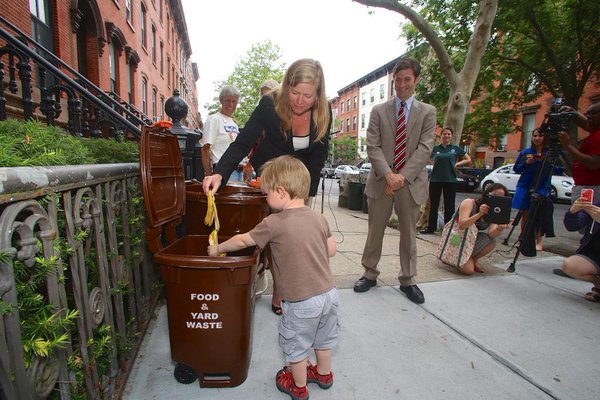
photo via NYC Sanitation
Today, the New York City Council will hold an oversight hearing on the Department of Sanitation's organic waste program started in 2013. The focus on organic waste is merited by the size of the waste stream (more than 1 million tons annually) and environmental benefits of reducing greenhouse gases through use of alternative disposal strategies, such as composting, rather than transport to distant landfills. The City plans to expand the pilot program citywide; however, a report published this week by the Citizens Budget Commission indicates the cost of doing so would be prohibitively expensive. Instead, City leaders should pursue a different strategy.
The Department of Sanitation (DSNY) currently collects organic waste from more than 186,600 households in the Bronx, Brooklyn, Queens, and Staten Island, as well as 200 large apartment buildings and 750 schools. The share of organic waste diverted ranges from 12 to 26 percent – lower than the citywide recycling rate (43 percent) – at a cost of $19 million over two years.
If the curbside program were expanded citywide, costs would balloon.
Most districts do not have sufficient unused truck capacity to substitute an organic waste collection for one weekly refuse collection or to use dual-bin trucks. CBC estimates at least 88,000 new truck-shifts would be needed for collections each year, resulting in citywide costs in the range of $177 million to $250 million per year – an increase of 10 to 15 percent on the $1.7 billion cost of residential waste collection and disposal.
Given these costs, DSNY should alter its strategy in three ways:
1. Expand curbside collections only where and when additional collection routes are not required. This could be achieved by either replacing a weekly refuse pickup with an organics pickup or collecting refuse and organics simultaneously with special trucks with two separate compartments. Achieving such efficiencies would require City Council approval and a significant boost to participation rates. Currently only one of the 59 sanitation districts would qualify, but at higher diversion rates as many as ten could.
2. Collaborate with the Department of Environmental Protection (DEP) to expand the use of in-sink disposers. DEP and DSNY should identify neighborhoods where in-sink disposers could be used without burdening wastewater treatment infrastructure. This strategy eliminates the need for curbside collections, bringing food waste from people's homes to digestion plants via water pipes and sewers, not trucks on roads.
3. Bring down the cost of all collections in the long-term. If wider diversion of organic waste is a high priority, collection costs must be reduced. Ideas for changes to collection routes and practices range from negotiating changes to the contract for sanitation workers to opening all or some residential waste collection to a competition among private carters.
As New York City seeks to achieve environmental benefits through wider diversion of organic waste, municipal leaders should understand that unless residential trash collection costs are reduced, new program costs will greatly overwhelm any potential savings from landfill reduction. A targeted strategy could be a way to preserve municipal resources and ensure organics programs are sustainable for the long term.
***
Carol Kellermann is President of the Citizens Budget Commission. On Twitter @cbcny.
***
Have an op-ed idea or submission for Gotham Gazette? Email This email address is being protected from spambots. You need JavaScript enabled to view it.




